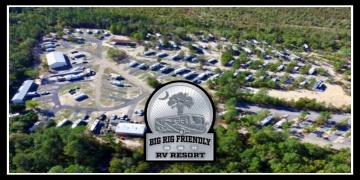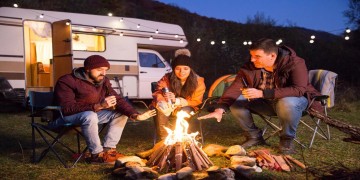Name of Blog
RV Tips Blog
Camping Tips Blog

Top Campground Tips: What to Do and Not Do
05-24-2018Author :Carrie Todd in Education
Rights and responsibilities, privileges and politeness—it seems more difficult than ever for people to get along with each other. This has even become evident when staying in RV parks, where you can often pick your site, but you can't always pick your neighbors. Although most campgrounds have posted courtesy signs and a set of easy-to-follow rules, there are many aspects that are left up to "common sense" and interpretation, and oftentimes, people just don’t know what to do.
Related Read: Road Rules: RV Campground Etiquette
For example, some people see their dogs as family members and allow them to approach other RVers unsolicited. Neighbors may find that annoying, especially if means that the dogs and/or their "parent" crosses through their campsite, which can also be a safety issue. Another example: wind chimes. Some people consider the music they produce a gift for the entire campground; others view the sound as noise pollution. It can be difficult to live in harmony with others when the lines aren't clearly defined. Additionally, easily avoided accidents or mishaps tend to increase tension, making basic manners more difficult to mind. So, here are a few safety and etiquette rules to make camping more enjoyable for everyone.Safety Dos
Although there are many things one must be aware of when driving and living in an RV, the ones listed here are those that cause frustration and anger when they're overlooked.
- Before heading to your destination, make sure to have all your camper and cargo door keys. It's also a good idea to have a second set that either someone else holds or that are hidden at a location outside of the RV.
- Learn where all the breakers and shut off valves are before you need them; take notes or draw a diagram for future reference.
- Always keep a first aid kit, fire extinguisher, duct tape, bungees, and some rope in your coach or trailer; you never know when you'll need them.
- Make sure all drawers and refrigerator doors are secure before driving, and do a final walk around outside to ensure everything is retracted and nothing is left behind.
- Check your tire pressure before heading out.
Once you arrive at the destination, take a moment to walk the campsite before pulling in. This allows you to see anything that might be in the way—like fire rings, firewood, or items left by previous campers—that aren't visible with backup cameras. If you use a satellite dish for Internet or television, check the signal before choosing a spot or parking. Make sure to park close enough to the connections and hook up the electricity to test for power before hooking up your water hoses or putting the jacks down and the slides out. Ensure the waste water hoses are tightly secured before dumping, and then release the black water first and "rinse" the hose with the gray water. Always keep the cargo doors locked.
Etiquette Dos
This is also a safety "do." When possible, reserve your campsite ahead of time so you know where you're going. It's preferable to, arrive before dark, as it irritates other campers when they're trying to relax—or even to sleep—and you're driving around looking for your space or attempting to back into the campsite in the dark. Arriving before the office closes also ensures you get a copy of the park rules and may even receive assistance parking without disrupting your new neighbors. Make sure your RV doesn't extend past your campsite, and during your stay, always keep your vehicles—as well as the vehicles of your visitors— parked in your designated space.
Get to know your neighbors. Be friendly, but not obnoxious; it's fairly easy to determine which ones are open to frequent visits and which prefer their privacy. If your neighbor's camper is dark and the blinds are drawn, this indicates they aren't "open" to visitors. Also, use your blinds accordingly and keep pets, movies, music, and conversations to a low volume. Be mindful of the campground's "quiet time." Be a responsible pet "parent" and keep them quiet, on a leash, and picked up after. Keep your campsite tidy, as well. Outdoor patio furniture or camping chairs are generally fine—depending on the campground—but your living room sofa and an overflowing trash bin aren't.
Be punctual when checking out; you don't want to delay the next camper's check in. Generally, mind your manners, be friendly, and cut people some slack.
Safety Do Nots
While camping, avoid running your coach's engine or generator for long periods, especially during "quiet time." They're noisy and emit pollution. Additionally, choose not to have loud arguments with your traveling companions or neighbors. Although this could be considered an etiquette issue, it is also a safety one. Loud arguments may lead to physical altercations. Even if they don't, your neighbors may alert the authorities—or depending on the state, show up with a firearm. If you can't keep the volume down, you might go for a walk.
Related Read: Keeping the Peace in Tiny Spaces
When preparing to leave the campground, remember the following tips:- Don't forget your water and sewer hoses or cable hook up.
- Don't forget to retract the antennae or satellite dish; if you have a freestanding satellite, don't forget to pack it.
- Don't forget to pull in awnings and the steps.
- Don't drive off with the jacks down.
Although this seems like common sense, these steps are often overlooked and can cause quite a bit of damage to your RV or the park, as well as inconvenience.
Etiquette Do Nots
Basically, be a good neighbor and don’t do anything that you wouldn't want done. Although that may seem self-explanatory with no possible areas of confusion, this is not the case. Here are a few common complaints.
Every occupied campsite was rented by its occupant. While their RV is there, don't walk through their space and don't let your pets walk through—or eliminate—there either. If the door is closed and the shades are drawn, don't knock. If you need to contact your neighbor, leave a note.
Some people love wind chimes or LED string lights, but others find them an annoying interruption in their personal sanctuary. Discuss these things with your neighbors before hanging something that may be controversial. Better yet, read the area. If many of the neighbors have chimes, lights, or other outside decorations, feel free to put yours out. If no one does, don't be the person who changes the environment for everyone else. Camping is supposed to be an enjoyable, peaceful experience. Make sure you aren't putting your desires above the comfort of the rest of the community.
Conclusion
Camping is not only one of the oldest pastimes, it is one of the oldest lifestyles. Although the design of the shelter has changed, and contemporary notions of manners have as well, most of the basics have remained the same. As Oliver Wendell Holmes said—and my father often quoted—"Your right to swing your arm ends just where the other man's nose begins."
Comment

Author : Carrie Todd
Initially, Carrie became a freelance writer, editor, and artist to support herself doing something she loves that also allows her to travel. Living in her Tourmaster coach, she has spent no more than five months in one place since October 2013. This ensures that she gets to experience the constantly changing scenery that accompanies the yearly seasonal changes, as well as meet new people across the country. She has since become a LuLaRoe Independent Fashion Consultant, as well to further this endeavor. In fact, Carrie considers herself fortunate, as most people have to be of retirement age to enjoy the sort of freedom she has, with every day bringing something different.
Related Blogs

Families Flock to Big Rig Friendly Resort in SC

Internet Options for RVers to Stay Connected
To RVers, the open road and ever-changing landscape provide unparalleled freedom and adventure. However, this lifestyle also brings unique challenges, especially when staying connected. There are plenty of reasons why reliable intern...

The Pros and Cons of Renting vs. Buying an RV
Are you intrigued by the lure of freedom that comes with exploring the great outdoors? Are you ready to embark on new adventures at a moment's notice? If so, the world of recreational vehicles (RVs) may be c...




